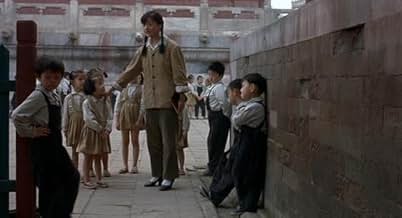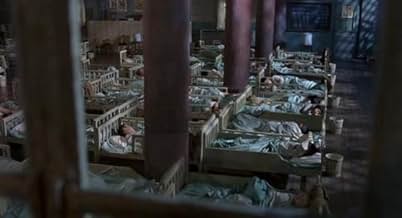Kan shang qu hen mei
- 2006
- 1 Std. 32 Min.
IMDb-BEWERTUNG
6,7/10
1583
IHRE BEWERTUNG
Füge eine Handlung in deiner Sprache hinzuA young boy starting school for the first time struggles to fit in to a strictly regimented society in in post-revolutionary China.A young boy starting school for the first time struggles to fit in to a strictly regimented society in in post-revolutionary China.A young boy starting school for the first time struggles to fit in to a strictly regimented society in in post-revolutionary China.
- Auszeichnungen
- 8 Gewinne & 3 Nominierungen insgesamt
Empfohlene Bewertungen
We are watching the world unfold through the eyes of a child and within minutes we are immersed in his reality as if in our own. What an amazing movie! It's one of those films that not only provokes you to start asking questions but also makes you try to think and find some answers.
And what incredible actors these little children are! They can surely teach a lesson in mastership certain "Hollywood stars". And as for the director Yuan Zhang - well, he had created a truly inspiring film!
So if you are looking for an interesting, deeply moving and allegorical story, this film is definitely worth seeing!
And what incredible actors these little children are! They can surely teach a lesson in mastership certain "Hollywood stars". And as for the director Yuan Zhang - well, he had created a truly inspiring film!
So if you are looking for an interesting, deeply moving and allegorical story, this film is definitely worth seeing!
I just watched this film on UK TV. I wasn't sure what to make of it at first but it did capture my attention - not least because I'm not familiar with the setting in a Mao generation kindergarten boarding school. I've no idea if any of the details are factual but it reminded me of a rather Dickensian idea of bringing up children - though kinder and more humane.
This is a "foreign film" and therefore there are no car chases, no murders and no serial killers. It's about real human beings - infants in this case. If anyone is upset about seeing little kids bottoms it's because you have had your mind poisoned by Anglo-Saxon attitudes and obsession with pedophiles. Obviously you must never have been around infants - toilet training is a big part of the day! Infants are basically sweet and innocent and these kids are mostly seen in that way. The approach in this film is affectionate and realistic - kids also have their evil little ways! I think the core message is that there is not much difference between the children's Kindergarten school routines and the adult society in Mao's China. The attitudes of the children will harden in the controlled society that exists outside when the games become real. The teachers, the educators will be replaced by other kinds of educators and wrong behaviour will be punished by re-education.When you watch the last 5 minutes you will see why I came to that conclusion (could be wrong!). Natural instincts become perverted by too much control. People are so regimented that they even have to poo and pee at he same time in a line in the same place!Something like that.
You have a delightful journey getting to that point. As stated elsewhere the children's performances are completely believable. Of course, it is fiction and some dramatic license is taken in regard to the freedom of movement the little boy protagonist has.
This is a "foreign film" and therefore there are no car chases, no murders and no serial killers. It's about real human beings - infants in this case. If anyone is upset about seeing little kids bottoms it's because you have had your mind poisoned by Anglo-Saxon attitudes and obsession with pedophiles. Obviously you must never have been around infants - toilet training is a big part of the day! Infants are basically sweet and innocent and these kids are mostly seen in that way. The approach in this film is affectionate and realistic - kids also have their evil little ways! I think the core message is that there is not much difference between the children's Kindergarten school routines and the adult society in Mao's China. The attitudes of the children will harden in the controlled society that exists outside when the games become real. The teachers, the educators will be replaced by other kinds of educators and wrong behaviour will be punished by re-education.When you watch the last 5 minutes you will see why I came to that conclusion (could be wrong!). Natural instincts become perverted by too much control. People are so regimented that they even have to poo and pee at he same time in a line in the same place!Something like that.
You have a delightful journey getting to that point. As stated elsewhere the children's performances are completely believable. Of course, it is fiction and some dramatic license is taken in regard to the freedom of movement the little boy protagonist has.
This is the story of a young boy making a little revolt of his own against his teachers. The plot (if you can call it that) unfolds slowly as we get to follow the kids in their day to day life at the school. The interaction between the kids is great and feels very authentic. Another thing worth mentioning is the photo and the way the camera is always placed in the kids point of view, so the audience always see the adults from below. On the minus side is that many scenes are very predictable and the lack of an actual plot makes it a bit too slow at times. But it's never boring and the heart-warming interaction between the kids as they go their own way makes this a film well worth seeing.
I'm disappointed by all of the previous comments on this film. This film seemed to me to be far more deeply layered and textured than previous writers have given it credit for.
Having studied Chinese film (particulary the work of the 5th generation, which this film isn't part of), it's my understanding that Chinese films can't be 'read' in the same way as Western films. Due to censorship in China Chinese directors find different ways of telling stories, more often than not by dressing them up as something else. Therefore I don't believe that this film can be taken at face value. I don't believe this is a film about a small boy being sent to a kindergarten by his father and trying to earn Little Red Flowers. I think an important thing to notice is the way the boy changes. He starts off hating the regime of the school but wanting to fit in, wanting to earn a red flower, but he never does, so he deliberately alienates himself. There are many scenes where he sets himself apart from the group, and he becomes a rebel - he stirs up unrest amongst the other children. He challenges the authority. This seems to me to be deeply allegorical.
I was hoping to read some comments here that would help me understand this film, because I'm finding it puzzling. I found it a very hard film to watch, and I can't say I really enjoyed it. I found it slow and repetitive with far too much emphasis on 'peeing and pooping'. However, I'm finding it a very interesting film to think about and try to decipher. I would very much like to read other readers comments on this. What, for example, is the significance of the hospital? And the children's names? There are many many questions to be answered, and many more to be asked. By my own admission I'm not very good at reading films, but I am aware of what needs to be read!
Having studied Chinese film (particulary the work of the 5th generation, which this film isn't part of), it's my understanding that Chinese films can't be 'read' in the same way as Western films. Due to censorship in China Chinese directors find different ways of telling stories, more often than not by dressing them up as something else. Therefore I don't believe that this film can be taken at face value. I don't believe this is a film about a small boy being sent to a kindergarten by his father and trying to earn Little Red Flowers. I think an important thing to notice is the way the boy changes. He starts off hating the regime of the school but wanting to fit in, wanting to earn a red flower, but he never does, so he deliberately alienates himself. There are many scenes where he sets himself apart from the group, and he becomes a rebel - he stirs up unrest amongst the other children. He challenges the authority. This seems to me to be deeply allegorical.
I was hoping to read some comments here that would help me understand this film, because I'm finding it puzzling. I found it a very hard film to watch, and I can't say I really enjoyed it. I found it slow and repetitive with far too much emphasis on 'peeing and pooping'. However, I'm finding it a very interesting film to think about and try to decipher. I would very much like to read other readers comments on this. What, for example, is the significance of the hospital? And the children's names? There are many many questions to be answered, and many more to be asked. By my own admission I'm not very good at reading films, but I am aware of what needs to be read!
The movie begins with a cute four year old boy - Fan Qiang Qiang - being admitted by his father in a boarding kindergarten since both the parents are working at different places and are not in a position to care for him.
The kindergaten is strict in enforcing discipline and expects all students to comply with a set of regulations which extend to an extensive gamut of activities from dressing/undressing by oneself, cleanliness, cordial communciaton to others, respect to elders, maintaining order and even to timely pooping (not to forget the washing of hands thereafter). Every successful compliance by the students is rewarded with the titular little red flower which are diplayed on a scoreboard against their names and any subversion results in forfeit of a flower earned earlier.
Qiang is a free spirit by nature and finds it difficult to comply with the strict routines of the school. He is unable to dress/undress himself and does not play with other children. He is also unable to get over the habit of wetting his bed which results in him being ridiculed as "the king of bedwetting" by other students. Consequently, he is unable to earn any little red flower which is so coveted. When his repeated attempts to conform and fit into his desginated role & behaviour fail, Qiang feels enormous frustration which pushes him down the road of being an aggressive rebel. The rest of the movie narrates how this conflict between a rebellious Qiang and the disciplinarian kindergarten unfolds.
This is a simple movie which, on the face of it, successfully captures the lives of the tiny tots in a rich canvas sparkling with laughter, fun, frolic, tensions, frustrations, helplesness, sadness as experienced by these cute little toddlers. At a deeper and not-so-subtle level, this movie represents a metaphor for the state of Chinese society under the Communist regime. It portrays the simmering conflict in the society between the innate tendency of every citizen to seek to establish their individuality and the efforts of a seemingly kind, yet oppressive state, which tries to micro-monitor as well as manage the affairs of individuals, through a defined regimen, for what it feels is for a loftier goal of collective order and resultant peace. In the process, any expressions of individuality are construed as a subversion of the carefully engineered public order and is brutally subjugated & crushed.
Through the struggles of his charming little protaganist, Qiang, the director, Zhang Yuan, has successfully captured this continuing conflict between conformity and individuality which permeats the Chinese society. He must also be commended for eliciting such authentic and believable performances (if one can call them so, for they appear so natural) from his cute little cast, especially the adorable and expressive Dong Bowen who plays the young Qiang.
The open-ended finale of the movie is apt for it throws several unanswered questions at the protaganist as well as the viewer and initaites a train of thought on the central conflict portrayed in the movie.
Clocking just about ninety minutes, this movie is short, subtle, highly engaging and raises several questions for the viewer on the merits of conformity, group mentality, need for individuality, the conflict between a society steeped on confirmity & group mentality when faced with expressions of individual freedom as well as the effects of such conflicts on individual members of such society.
The kindergaten is strict in enforcing discipline and expects all students to comply with a set of regulations which extend to an extensive gamut of activities from dressing/undressing by oneself, cleanliness, cordial communciaton to others, respect to elders, maintaining order and even to timely pooping (not to forget the washing of hands thereafter). Every successful compliance by the students is rewarded with the titular little red flower which are diplayed on a scoreboard against their names and any subversion results in forfeit of a flower earned earlier.
Qiang is a free spirit by nature and finds it difficult to comply with the strict routines of the school. He is unable to dress/undress himself and does not play with other children. He is also unable to get over the habit of wetting his bed which results in him being ridiculed as "the king of bedwetting" by other students. Consequently, he is unable to earn any little red flower which is so coveted. When his repeated attempts to conform and fit into his desginated role & behaviour fail, Qiang feels enormous frustration which pushes him down the road of being an aggressive rebel. The rest of the movie narrates how this conflict between a rebellious Qiang and the disciplinarian kindergarten unfolds.
This is a simple movie which, on the face of it, successfully captures the lives of the tiny tots in a rich canvas sparkling with laughter, fun, frolic, tensions, frustrations, helplesness, sadness as experienced by these cute little toddlers. At a deeper and not-so-subtle level, this movie represents a metaphor for the state of Chinese society under the Communist regime. It portrays the simmering conflict in the society between the innate tendency of every citizen to seek to establish their individuality and the efforts of a seemingly kind, yet oppressive state, which tries to micro-monitor as well as manage the affairs of individuals, through a defined regimen, for what it feels is for a loftier goal of collective order and resultant peace. In the process, any expressions of individuality are construed as a subversion of the carefully engineered public order and is brutally subjugated & crushed.
Through the struggles of his charming little protaganist, Qiang, the director, Zhang Yuan, has successfully captured this continuing conflict between conformity and individuality which permeats the Chinese society. He must also be commended for eliciting such authentic and believable performances (if one can call them so, for they appear so natural) from his cute little cast, especially the adorable and expressive Dong Bowen who plays the young Qiang.
The open-ended finale of the movie is apt for it throws several unanswered questions at the protaganist as well as the viewer and initaites a train of thought on the central conflict portrayed in the movie.
Clocking just about ninety minutes, this movie is short, subtle, highly engaging and raises several questions for the viewer on the merits of conformity, group mentality, need for individuality, the conflict between a society steeped on confirmity & group mentality when faced with expressions of individual freedom as well as the effects of such conflicts on individual members of such society.
Top-Auswahl
Melde dich zum Bewerten an und greife auf die Watchlist für personalisierte Empfehlungen zu.
- How long is Little Red Flowers?Powered by Alexa
Details
Box Office
- Weltweiter Bruttoertrag
- 303.898 $
- Laufzeit1 Stunde 32 Minuten
- Farbe
- Sound-Mix
Zu dieser Seite beitragen
Bearbeitung vorschlagen oder fehlenden Inhalt hinzufügen

Oberste Lücke
By what name was Kan shang qu hen mei (2006) officially released in India in English?
Antwort



















